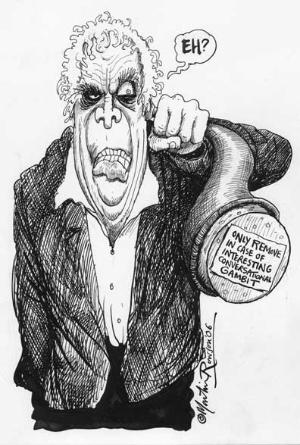Some of the good old jokes came flooding back as I sat outside my doctor’s door waiting to have my ears examined. “Excuse me, but did you realise you had a sixpence in your ear?” “I’m sorry, I can’t hear you. I’ve got a sixpence in my ear.” (I warned you they were old jokes). There was even one I thought I might be able to use on my doctor. “Good morning, doctor,” I’d say. “I think I’m losing my hearing.” And then he’d go: “What are the symptoms?” And then I’d lean forward a little and say, “It’s a television show about a little yellow family. But what’s that got to do with my problem?”
 But as it turned out, my doctor hadn’t mastered his script. “When did you first find yourself having difficulties with your hearing,” he asked with great precision. “It’s only really in crowded pubs,” I told him, “when there are five or six people all talking at once and there’s music on in the background and perhaps a blaring television in the corner.”
But as it turned out, my doctor hadn’t mastered his script. “When did you first find yourself having difficulties with your hearing,” he asked with great precision. “It’s only really in crowded pubs,” I told him, “when there are five or six people all talking at once and there’s music on in the background and perhaps a blaring television in the corner.”
“And how do you deal with this problem?” “Well,” I explained, “I nod an awful lot in the direction of anyone whose lips are moving and then try to pick out at least one word from the conversation which I can use as a starting point for a personal monologue. So if, for example, I hear the word ‘potato’, I can set off on a long trope about how they don’t make crisps like they used to and does anyone remember how in the old days Smith’s used to put a little blue twist of salt in every packet and then this was revived a few years ago but never caught on so now we’re all forced to eat salty crisps whether we want to or not.”
My doctor told me in what seemed an oddly weary voice that I’d made my point and that he’d now like to move to an examination. He came round from behind his desk and shone a pencil torch into my ear. “Nothing obviously wrong there,” he said, pulling down my lobes to get a better angle for his spotlight. What a pity. I’d been rather hoping for something obviously wrong. An immediately apparent and readily removable impediment. Like a sixpence.
“I think I’ll refer you to an audiologist for a proper hearing test,” he announced from the sink where he was washing his hands with all the hygienic intensity of a man recently exposed to a plague rat. “They’ve got all the specialist equipment.”
My audiologist was delightfully reassuring, although it was slightly disturbing to discover that her consulting room was solely decorated with large advertisements for extraordinarily discreet (actual size as shown) and inordinately expensive (£900 each or £1600 for a pair) hearing aids. It occurred to me as I strapped on the earphones she provided that I was in an equivalent position to someone who’d popped into an artificial limb clinic to have some tests done on a gyppy knee. The outcome was already commercially assured.
But I still sat and did my best. “Call out the sounds you hear,” she said. “Test?” “Good.” “Vest?” “Good.” “Jest?” “Good.” “Dest?” “Try again.” “Kest?” “And again.”
“Well,” she said 10 minutes later, resuming her seat behind the desk, “I’m pleased to tell you that you don’t have any significant hearing loss. You can hear sounds across the full dB range of frequencies although there is some slight indication that there may be a modest loss of capacity in the upper frequency levels. But that’s no impediment to a full social life.”
“Unless one were a dog,” I riposted with all the devil-may-care flippancy of someone who’d suddenly discovered a cheque for £900 nestling in his back pocket.
“Actually,” she continued, “I’ve come across one or two cases of this condition in older people who lead active social lives. We even referred one man who was absolutely convinced of his oncoming deafness to a psychologist.”
And his diagnosis? “I can’t remember it exactly. But his rough conclusion was that the patient had simply become terminally bored with his friends’ customary utterances. In order to overcome his ennui he’d unconsciously developed an hysterical deafness. He never listened properly to a word they said.”
I thanked her for her help and rose to go. “You know what this reminds me of,” I said as I made it to the door handle, “there was this man who was driving home one night and got pulled over by the police. ‘I’m sorry, sir,’ says the traffic cop. ‘But did you know that a few intersections back, your wife fell out of your car?’ ‘Oh, thank God for that,’ says the man. ‘For a minute I thought I’d gone deaf.”
As I closed the door behind me I could swear that I heard a slight, ever so slight, middle frequency chuckle. ■

